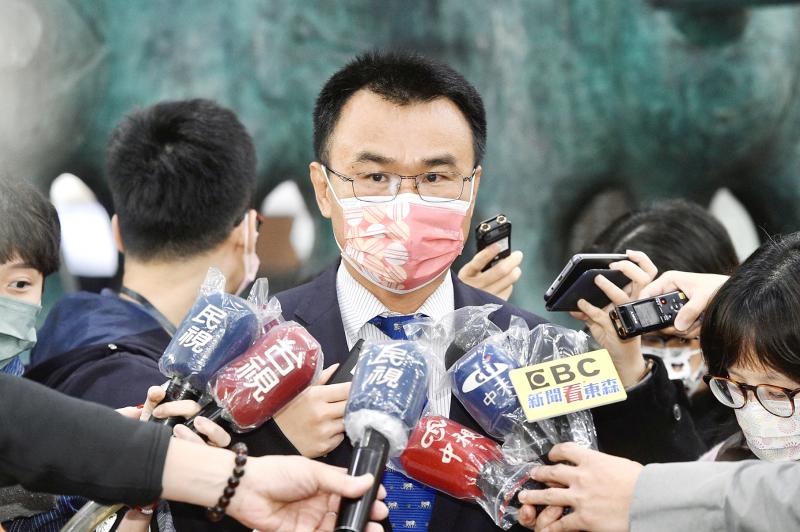Ninety-three percent of elementary and junior-high schools that offer lunch use locally produced food ingredients, Council of Agriculture Minister Chen Chi-chung (陳吉仲) said yesterday, in response to concerns that food imported from five Japanese prefectures near the Fukushima Dai-ichi nuclear power plant would be served in school lunches.
Chen made the statement as elementary and junior-high schools across the country are to reopen tomorrow, following a three-week winter break.
The Executive Yuan on Tuesday announced that Taiwan is by the end of this month to lift an 11-year ban on the importation of all food products produced in Japan’s Fukushima, Ibaraki, Tochigi, Gunma and Chiba prefectures, as long as importers and food manufacturers provide a certificate of origin and a radiation inspection certificate for their products.

Photo: George Tsorng, Taipei Times
Mushrooms, wild game and hill potherbs produced in the five prefectures remain banned.
However, some parents are concerned that schools would use food products from the five Japanese prefectures as ingredients in school lunches.
Chen told reporters on the sidelines of a conference that 93 percent of school lunches use ingredients of premium agricultural foods that meet Taiwan’s “certified agricultural standards.”
There are also certified “traceable agricultural products” and organic food, he said, adding that the origins of the food products can be traced through QR codes assigned to them.
“These mechanisms are to ensure that more than 3,000 elementary and junior-high schools in Taiwan use healthy and fresh domestically produced ingredients in lunches,” he said. “Students and their parents can be assured that school lunches are safe to eat, and the nation’s food and agricultural education can advance further.”
A draft food and agricultural education act is being reviewed by legislators and should be passed in the upcoming legislative session, Chen said, adding that the bill is important, as it would promote the use of local agricultural products.
Chen reiterated that the government has implemented a series of mechanisms for inspecting food imported from the five Japanese prefectures.
Aside from proof of origin and radiation inspection certificates, products imported from the five prefectures would be subject to inspections batch by batch at the border, Chen added.
Inspection results would be published daily on the Food and Drug Administration’s Web site, he said.
The nation’s six laboratories equipped to inspect residual radiation in food are capable of processing 70,000 samples per year, Chen said.
Once Taiwan allows the entry of food products from the five prefectures, the number of Japanese food products to be inspected annually would only increase to about 20,000 from 17,000, he said.
The council would also inspect aquatic food products sold at retail markets, he said.
The nation’s maximum levels of iodine-131, cesium-134 and cesium-37 in general food products are 10 to 100 becquerels per kilogram.

PRAISE: Japanese visitor Takashi Kubota said the Taiwanese temple architecture images showcased in the AI Art Gallery were the most impressive displays he saw Taiwan does not have an official pavilion at the World Expo in Osaka, Japan, because of its diplomatic predicament, but the government-backed Tech World pavilion is drawing interest with its unique recreations of works by Taiwanese artists. The pavilion features an artificial intelligence (AI)-based art gallery showcasing works of famous Taiwanese artists from the Japanese colonial period using innovative technologies. Among its main simulated displays are Eastern gouache paintings by Chen Chin (陳進), Lin Yu-shan (林玉山) and Kuo Hsueh-hu (郭雪湖), who were the three young Taiwanese painters selected for the East Asian Painting exhibition in 1927. Gouache is a water-based

A magnitude 4.1 earthquake struck eastern Taiwan's Hualien County at 2:23pm today, according to the Central Weather Administration (CWA). The epicenter of the temblor was 5.4 kilometers northeast of Hualien County Hall, at a depth of 34.9 km, according to the CWA. The earthquake's intensity, which gauges the actual effect of a temblor, was the highest in Hualien County, where it measured 2 on Taiwan's 7-tier intensity scale. The quake also measured an intensity of 1 in Yilan county, Taichung, Nantou County, Changhua County and Yunlin County, the CWA said. There were no immediate reports of damage or injuries.

OFF-TARGET: More than 30,000 participants were expected to take part in the Games next month, but only 6,550 foreign and 19,400 Taiwanese athletes have registered Taipei city councilors yesterday blasted the organizers of next month’s World Masters Games over sudden timetable and venue changes, which they said have caused thousands of participants to back out of the international sporting event, among other organizational issues. They also cited visa delays and political interference by China as reasons many foreign athletes are requesting refunds for the event, to be held from May 17 to 30. Jointly organized by the Taipei and New Taipei City governments, the games have been rocked by numerous controversies since preparations began in 2020. Taipei City Councilor Lin Yen-feng (林延鳳) said yesterday that new measures by

‘WORSE THAN COMMUNISTS’: President William Lai has cracked down on his political enemies and has attempted to exterminate all opposition forces, the chairman said The legislature would motion for a presidential recall after May 20, Chinese Nationalist Party (KMT) Chairman Eric Chu (朱立倫) said yesterday at a protest themed “against green communists and dictatorship” in Taipei. Taiwan is supposed to be a peaceful homeland where people are united, but President William Lai (賴清德) has been polarizing and tearing apart society since his inauguration, Chu said. Lai must show his commitment to his job, otherwise a referendum could be initiated to recall him, he said. Democracy means the rule of the people, not the rule of the Democratic Progressive Party (DPP), but Lai has failed to fulfill his